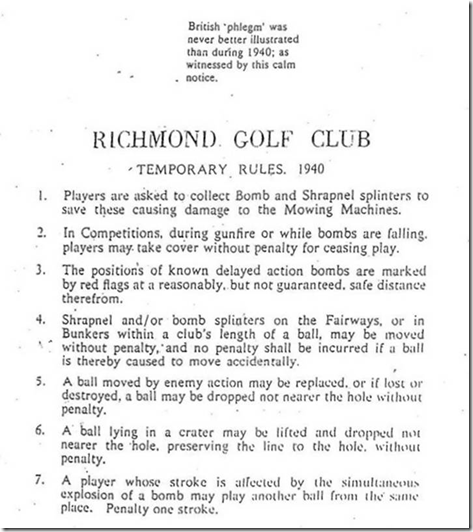The rules of golf: Remove shrapnel from the course, take cover during bombing runs and take a free drop if your ball is destroyed by enemy action
/Perhaps I just enjoy golfing more, and perhaps I do not require as much sleep as most, but I have a great number of friends who enjoy golfing (and play much better than me) who are unwilling to join me at 6:00 AM on the back nine of our local golf course for a round of early morning golf. It’s quite a deal. If you’re willing to get up early enough, you can lineup at the tenth tee box with the other early risers and play nine holes of golf on a first-come-first-served basis. The first foursome tees off at 6:30 AM, and if you play fast enough, you can be walking off the course well before 9:00 AM with the rest of the day ahead of you.
For guys with little kids at home, this is the perfect way to squeeze in a couple rounds of golf every weekend. Wake up around 5:00 on Saturday and Sunday, grab a quick breakfast, and lineup at 6:00 for a 6:30 start.
Even the most demanding of spouses would have a hard time complaining about the convenience of a round of golf finishing before 9:00.
Yet I only have a small handful of friends willing to do so on a regular basis.
It baffles me.
I suspect that had these weak-willed, pillow-loving men and women lived in England during World War II, they may have stayed away from the golf course after reading this set of wartime rules.
Even I think that this is taking dedication to the sport a bit too far.
Please note the last rule:
"A player whose stroke is affected by the simultaneous explosion of a bomb may play another ball from the same place. Penalty one stroke.”
A PENALTY? A bomb explodes in the middle of your back swing and you still incur a penalty? These Brits take their golf very seriously. _________________________________________
This notice posted in war-torn Britain in 1940 for golfers with stiff upper lips.
German aircraft from Norway would fly on missions to northern England; because of the icy weather conditions, the barrels of their guns had a small dab of wax to protect them. As they crossed the coast, they would clear their guns by firing a few rounds at the golf courses. Golfers were urged to take cover.
